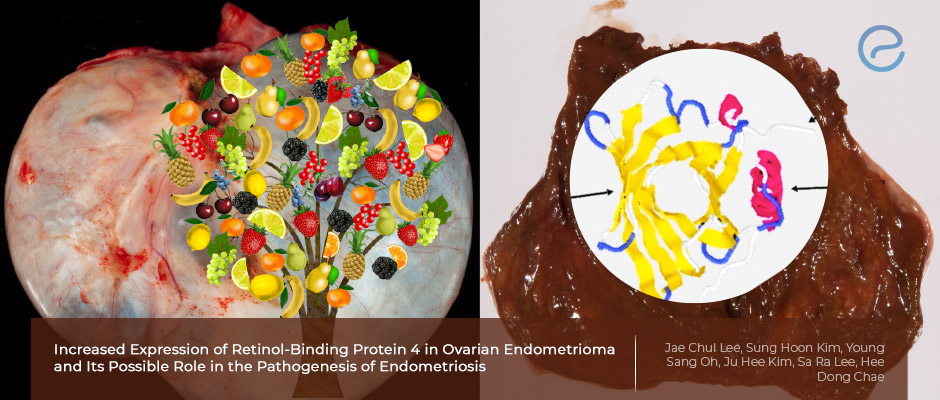Retinol-binding protein in endometriosis pathogenesis
Jul 12, 2021
Pioneering scientific results of retinol-binding protein4 in endometriosis
Key Points
Highlights:
- Retinol binding Protein 4, may have a potential role in endometriosis pathogenesis, as being involved in cell growth, invasion, differentiation, migration, and activation of cytokines, chemokines, and growth factors.
What's done here:
- The possible role of RBP4 in the pathogenesis of endometriosis was evaluated by comparing the levels of RBP4 in the peritoneal fluid and tissues of women with and without endometriosis.
- As an important adjunct, in vitro effects of RBP4 on the viability, proliferation, and invasiveness of endometrial stromal cells were also investigated.
Key results:
- RBP4 levels were significantly higher in peritoneal fluids of women with endometriosis, RBP4 immunoreactivity higher in ovarian endometriomas, and advanced-stage endometriosis compared to controls.
-
RPP4 immunoreactivity was higher in ovarian endometrioma than in the eutopic endometrium from controls in all phases of the menstrual cycle.
-
The RBP4 expression was higher in the stromal cell of ovarian endometrioma compared to the eutopic endometrium of endometriosis patients during the secretory phase.
-
In vitro treatment with human recombinant RBP4 increases the viability, proliferation, and invasiveness of endometrial stromal cells.
Future implications :
- This is a unique pioneering study about the role of RBP4 in endometriosis with encouraging results yielding an open gate to scientific research on the topic.
Lay Summary
Dr. Jae Chul Lee and associates from the Department of Obstetrics and Gynecology, University of Ulsan College of Medicine, Asan Medical Center, Seoul, Korea, have published the recent results of their research on endometriosis regarding the role of retinol-binding protein4 (RBP4) in the "International Journal of Molecular Sciences".
Endometriosis appears to affect 5–10% of the women of reproductive age, but about 80% of the women with pelvic pain, and 20–50% of the women with infertility suffer from this chronic illness. A plasma retinol transporter, named "retinol-binding protein 4 (RBP4)" carries retinol from the liver to the periphery and has important functions on the regulation of insulin sensitivity and energy metabolism.
It is possible that RBP4 could have a potential role in the pathogenesis of endometriosis, through its well-known potential effects on cell growth, invasion, differentiation, migration, and activation of cytokines, chemokines, and growth factors.
The peritoneal fluids were collected in the follicular phase from patients with advanced-stage endometriosis (n = 6) and from the control group (n = 6) who do not have endometriosis during laparoscopic surgery. A human proteome profile array was initially performed for analyzing the peritoneal fluids according to standard instructions. RBP4 levels were found to be significantly higher in the peritoneal fluids of the women of the endometriosis group.
The immunohistochemical analyses for the reactivity for RBP4 were found to be significantly higher in endometrioma compared to eutopic endometria from both patients and controls in all phases of the menstrual cycle. The RBP4 expression was also higher in the stromal cell of ovarian endometrioma compared to the eutopic endometrium of endometriosis patients during the secretory phase. In vitro treatment with human recombinant-RBP4 significantly increased the viability, proliferation capacity, and invasiveness of endometrial stromal cells.
The authors concluded that “the results of this study strongly suggest that RBP4 might partake in the pathogenesis and/or pathophysiology of endometriosis by increasing the viability, proliferation, and invasiveness of endometrial cells”.
Research Source: https://pubmed.ncbi.nlm.nih.gov/34072419/
endometriosis retinol-binding protein4 immunohistochemistry advanced stage peritoneal fluid menstruation. pioneering research

